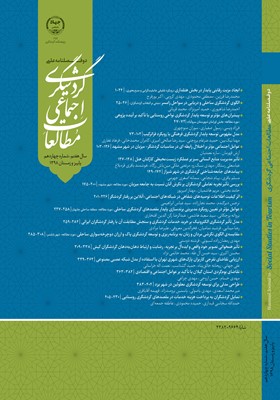ایجاد مزیت رقابتی پایدار در بخش هتلداری (رویکرد تلفیقی عاملیتگرایی و منبعمحوری)
محورهای موضوعی :
محمدرضا فرزین
1
,
مصطفی محمودی
2
,
مهدی کروبی
3
,
اکبر پورفرج
4
![]()
1 - دانشیار گروه مدیریت جهانگردی، دانشکده مدیریت و حسابداری،
2 - دانشکده مدیریت و حسابداری علامه طباطبایی
3 - دانشگاه علامه طباطبایی تهران
4 - دانشگاه علامه طباطبایی
کلید واژه: هتل, مزیت رقابتی پایدار, رویکرد عاملیتگرایی, رویکرد منبعمحوری, شایستگی کارکنان,
چکیده مقاله :
هدف پژوهش حاضر، مطالعه مزیت رقابتی پایدار با توجه به شایستگیهای مورد نیاز کارکنان هتلها میباشد تا رقابتپذیری هتلها را به طور مداوم تضمین کند. دیدگاه منبع محوری بر این نکته تأکید دارد که سازمانها باید توجه خود را معطوف منابع داخلی خصوصاً منابعانسانی کنند و رویکرد عاملیتگرائی نیز بر نقشآفرینی کارکنان و تعاملات آنان درون چارچوب کنش دارد. نوع پژوهش توسعهای/کاربردی و توصیفی/پیمایشی بوده و جمعآوري دادهها، بر اساس پرسشنامهاي متشکل از 73 سؤال و انتخاب نمونه تصادفی 260 نفري از ميان مديران و كاركنان هتلهای پنج ستاره تهران انجام پذیرفت. تجزيه و تحليل دادهها، با استفاده از روش الگوسازي معادلات ساختاري - در دو بخش الگوي اندازهگيري – جهت بررسي ويژگي فني پرسشنامه و بخش ساختاري، جهت بررسي فرضيههاي پژوهش انجام پذيرفت. يافتههاي پژوهش، حاكي از تأثير مثبت و معنادار متغیر چارچوب کنش بر کنشگر شایسته و کنشگر شایسته بر ایجاد مزیت رقابتی پایدار در اشکال نوآوری تولیدی، فرآیندی و اداری دارد. بر مبناي نتايج تحقيق، میان عوامل چارچوب کنش یعنی رفاه ذهنی، اعطای آزادی مثبت، تسهیم دانش، رهبری تحولآفرین، برابری سازمانی و تأمین قراردادهای روانشناختی با مهارتهای فردی، بین فردی و مدیریتی و نیز شایستگی سازمانی کارکنان ارتباط وجود دارد. ایجاد شرایط لازم برای نقشآفرینی کارکنان و تدوین آزمونهای استخدامی و استانداردهای ارزیابی عملکرد براساس مهارتها و شایستگیهای شناسایی شده در این پژوهش به مدیران هتلهای ایران پیشنهاد میشود.
This paper studied sustainable competitive advantage in competencies required by the hotel staff to ensure the permanent competitiveness of the hotels. The Resource-based View emphasizes the organizations need to attend internal resources, especially human resources. The agency approach emphasizes on staff role-play and their interaction within the framework. This research was a developmental-applied and descriptive-quantitative survey. For data collection, we distributed a questionnaire of 73 questions among a random selection of 260 individuals, including the managers and the staff of five-star hotels in Tehran. Using the structural equation modeling, we analyzed the data in both the measuring model section and the structural section to examine the technical features and the research hypothesis, respectively. Findings showed positive and meaningful impacts of the action-framework variable on the competent actor, and the competent actor showed the same impacts on creating a sustainable competitive advantage in the forms of productive, process, and administrative innovations. Based on the results, there was a relationship between the factors of action framework (i.e., mental welfare, affirmative freedom grant, knowledge sharing, revolutionary leadership, organizational equality, providing psychological conventions) and inter-personal, intra-personal skills and managerial skills and organizational competence of the staff. Finally, the hotel managers in Iran were recommended to provide the groundwork for staff role-play and to design job-tests and performance-appraisal standards, based on the skills and competencies identified in this study.
